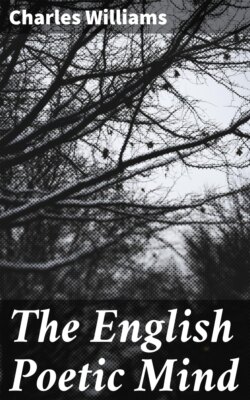Читать книгу The English Poetic Mind - Charles Williams - Страница 3
На сайте Литреса книга снята с продажи.
PREFACE
ОглавлениеTable of Contents
The following essays are based on two convictions: (1) that Troilus and Cressida is of a great deal more importance in a study of Shakespeare than has generally been allowed, (2) that the central crisis of Troilus is in direct poetic relation to the culminating crisis in Wordsworth’s account of his own history in the Prelude. From these convictions I went on to consider whether that crisis had any parallels in the work of the other English poets, and whether it might, not unreasonably, be related to the Satan of Milton, compared with the Nightingale of Keats, and contrasted with the Lancelot of Tennyson. Upon this subject it would have been possible to write a book either of five hundred or of two hundred pages; I chose two hundred with equal reluctance and decision.
I have called it the English Poetic Mind rather than the English Poetic Genius, because the word genius, in that context, might be supposed to have reference rather to ‘English’ than to ‘Poetic’; to allude to the feelings which (as Sir Arthur Quiller Couch has suggested) should be aroused in us when we stand by the tomb of the Black Prince in Canterbury Cathedral rather than to those which are aroused by the reading of Henry V. With the patriotism of Shakespeare and Milton and the rest I have nothing to do; only with their poetry. But to omit the geographical limitation altogether would have been too bold; the present title sounds more like the tentative suggestion which the book is meant to offer.
Even so, all the English poets are not here: Chaucer, Spenser, Dryden, for example. I can only plead that two hundred pages are better than five hundred, and that to do more than is here done would have meant the five hundred: it would have had to be a full volume with notes and appendices and longer quotations and digressions and defences and explanations all complete. Aristotle on tragedy and De Quincey on power and Coleridge on poetry and everybody on Shakespeare and almost everybody on Keats would have had to come in. To the general critical intelligence of our own times I owe of course a profound debt, poorly as this study may seem to pay any of it; to the critical authority of the past a proper obedience. But on the central question of Troilus I am not conscious of owing any particular debt at all. Something of the possibility I tried to put into verse in my Myth of Shakespeare; it is here defined in prose.
Of one fact I am a little proud. The suggestions made here are quite unexclusive. Shakespeare, Milton, and Wordsworth may have been moved by any personal cause or aiming at any moral or metaphysical purpose conceivable—it does not matter, I have been concerned with the poetry only as it exists, and with its interrelation. Even the prose statements which the poets themselves made about their poetry are omitted. Criticism has done so much to illuminate the poets, and yet it seems, with a few exceptions, both of the past and the present, still not sufficiently to relate the poets to the poets, to explain poetry by poetry. Yet in the end what other criterion have we? Wordsworth’s poetry is vii likely to explain Shakespeare’s poetry much better than we can, because poetry is a thing sui generis. It explains itself by existing. There has been a great deal too much talking of what the poets mean. They also are mortal; they also express themselves badly sometimes; they also sometimes fail to discover quite finally the exact scope of their desire. We can enjoy ourselves talking about them, of course; the multitudinous printed chat of generations lies behind and around us. But criticism—is it being stupid to say that in the end the poets themselves must do that also for us? We know so little unless they tell us; we feel as they direct us; we are disordered and astray unless they govern us. Poetry is a good game—let us take it lightly. But it is also ‘liberty and power’—let us take it seriously. Ad maiorem poetarum gloriam—there is but one ascription more worthy than that, and in the tradition of Christendom it was amid a cloud of songs as well as of seraphs that the Divine Word accepted incarnation.
C. W.
